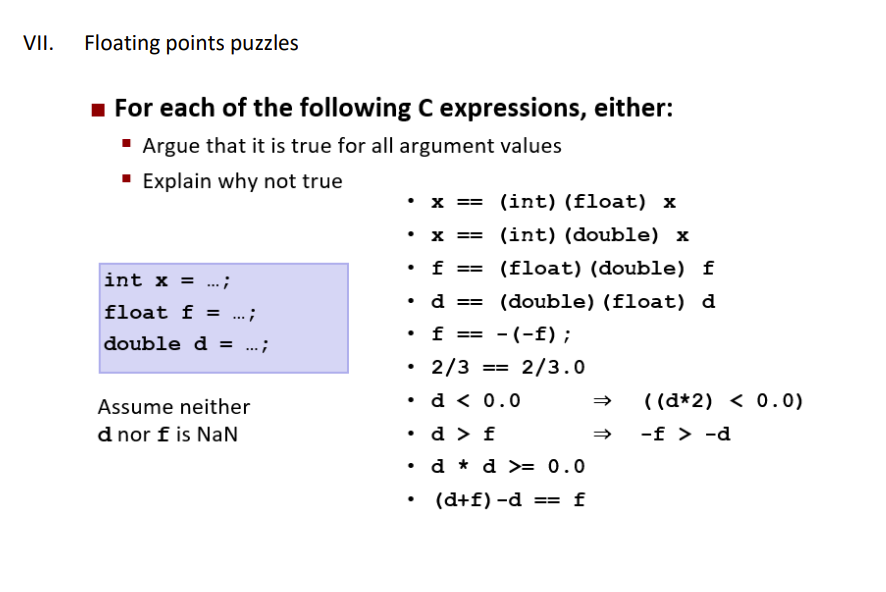VII. Floating points puzzles ■ For each of the following C expressions, either: ▪ Argue that it is true for all argument values ▪ Explain why not true int x = ..; float f = ...; double d = ..; Assume neither d nor f is NaN • x == (int) (float) x (int) (double) x x == • f == (float) (double) f d == (double) (float) d - (-f); == 2/3.0 . 4 . == 2/3 d < 0.0 • d > f dd >= 0.0 (d+f) -d == f ((d*2) < 0.0) -f> -d
VII. Floating points puzzles ■ For each of the following C expressions, either: ▪ Argue that it is true for all argument values ▪ Explain why not true int x = ..; float f = ...; double d = ..; Assume neither d nor f is NaN • x == (int) (float) x (int) (double) x x == • f == (float) (double) f d == (double) (float) d - (-f); == 2/3.0 . 4 . == 2/3 d < 0.0 • d > f dd >= 0.0 (d+f) -d == f ((d*2) < 0.0) -f> -d
C++ for Engineers and Scientists
4th Edition
ISBN:9781133187844
Author:Bronson, Gary J.
Publisher:Bronson, Gary J.
Chapter11: Introduction To Classes
Section11.3: Adding Class Functions
Problem 7E
Related questions
Question

Transcribed Image Text:VII.
Floating points puzzles
■ For each of the following C expressions, either:
▪ Argue that it is true for all argument values
▪ Explain why not true
int x = ..;
float f = ...;
double d =
..;
Assume neither
d nor f is NaN
• x == (int) (float) x
(int) (double) x
x ==
• f ==
(float) (double) f
d ==
(double) (float) d
- (-f);
== 2/3.0
.
.
4
==
2/3
d < 0.0
• d > f
dd >= 0.0
(d+f) -d == f
((d*2) < 0.0)
-f> -d
Expert Solution
This question has been solved!
Explore an expertly crafted, step-by-step solution for a thorough understanding of key concepts.
This is a popular solution!
Trending now
This is a popular solution!
Step by step
Solved in 2 steps

Knowledge Booster
Learn more about
Need a deep-dive on the concept behind this application? Look no further. Learn more about this topic, computer-science and related others by exploring similar questions and additional content below.Recommended textbooks for you

C++ for Engineers and Scientists
Computer Science
ISBN:
9781133187844
Author:
Bronson, Gary J.
Publisher:
Course Technology Ptr

C++ for Engineers and Scientists
Computer Science
ISBN:
9781133187844
Author:
Bronson, Gary J.
Publisher:
Course Technology Ptr